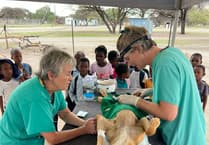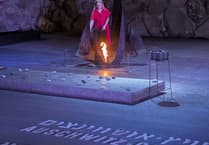These words were on one of the home-made placards seen as the TV cameras scanned the crowds in St Peter’s Square for the funeral of Pope Francis: “Thank you Francis!”.
Among standout comments during the TV coverage were that the Pope was ‘a huge global figure’, and ‘touched minds and hearts’.
Among his own statements quoted was that ‘diversity is of God’; and ‘we should build bridges, not walls’.
The tributes both from the Catholic faithful and from others the world over have been fulsome in their praise of this extraordinary man.
Born in Argentina to an Italian migrant family, Jorge Mario Bergoglio was a simple and humble man, devoting his pastoral care to the poor and marginalised as a Jesuit priest and then as bishop in Buenos Aires.
When, much to his surprise, he was elected Pope in 2013, he asked the crowds in St Peter’s Square to pray for him. Even more surprising was his choice of ‘Francis’ as his papal name. St Francis of Assisi was known for his humility and self-imposed poverty - he gave away his riches to work among the poor - and for his love and care for nature and the environment.
Inspired by his example, Pope Francis lived in a hostel in the Vatican instead of the papal apartments and used public transport rather than the papal limousine.
He went out of his way to spend time with the poor, the marginalised, minorities and migrants. Confronted by a reporter on how would deal with a gay person, his answer was: “Who am I to judge?”, indicating his own humility and his belief in inclusiveness: all people are children of God.
He was a man of action who would not take no for an answer when responding to urgent need.
When he expressed the wish to visit migrants in Lampedusa among the thousands arriving there, often in a desperate state, Vatican officials responded “it will take weeks to organise”.
Pope Francis took matters into his own hands: a few days later the same officials discovered that someone called Jorge Bergoglio had booked a flight to Lampedusa!
Right to the end he demonstrated true Christian charity: despite his frailty after very recent illness, on Maundy Thursday he visited the inmates of a Roman prison.
He imparted his Easter blessing in St Peter’s Square less than 24 hours before his death.
Only then did he respond to the call of his maker… having done his pastoral duty to the end.
Perhaps his greatest achievement was to provide moral leadership - not just to Catholics, but to the world.
He was not afraid to speak out about the injustice of poverty and oppression, against war and violence.
Certain world leaders were unhappy about his criticism, particularly those who profess to be Christian but whose political decisions are the very antithesis of the true Christian principles by which Francis lived.
He published two very significant encyclical letters to guide his Church: ‘Fratelli tutti’ encouraged solidarity and fraternity among all people, and rejection of war.
‘Laudato si’ focused on our need to “take care of our common home".
Pope Francis criticised consumerism and irresponsible economic development, lamenting damage to the environment and global warming: a huge contribution to the fight against climate change.
Even in death Pope Francis continues to provide a message of hope and to have an impact: world leaders gathered for his funeral held impromptu meetings… which we hope might lead to a peaceful end to conflict.
His legacy will, no doubt, influence the choice of his successor.
I for one hope for more attention to young people, the future of the Church.
Whoever is the next pope, many will hope that he will continue Francis’s good work in making the Church more inclusive, closer to the people, and offering a voice of moral authority for a world in turmoil.





Comments
This article has no comments yet. Be the first to leave a comment.